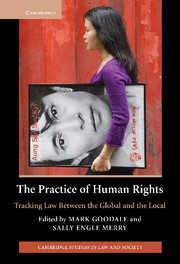Book contents
- Frontmatter
- Contents
- Contributors
- Acknowledgments
- Introduction Locating rights, envisioning law between the global and the local
- PART ONE STATES OF VIOLENCE
- PART TWO REGISTERS OF POWER
- PART THREE CONDITIONS OF VULNERABILITY
- Introduction
- 5 Rights to indigenous culture in Colombia
- 6 The 2000 UN Human Trafficking Protocol: rights, enforcement, vulnerabilities
- PART FOUR ENCOUNTERING AMBIVALENCE
- Conclusion Tyrannosaurus lex: the anthropology of human rights and transnational law
- Index
- References
Introduction
Conditions of Vulnerability
Published online by Cambridge University Press: 29 March 2011
- Frontmatter
- Contents
- Contributors
- Acknowledgments
- Introduction Locating rights, envisioning law between the global and the local
- PART ONE STATES OF VIOLENCE
- PART TWO REGISTERS OF POWER
- PART THREE CONDITIONS OF VULNERABILITY
- Introduction
- 5 Rights to indigenous culture in Colombia
- 6 The 2000 UN Human Trafficking Protocol: rights, enforcement, vulnerabilities
- PART FOUR ENCOUNTERING AMBIVALENCE
- Conclusion Tyrannosaurus lex: the anthropology of human rights and transnational law
- Index
- References
Summary
Vulnerability is central to human rights activism and intervention. In identifying which individuals are understood as victims of human rights violations, those who are selected are typically those who are in some way helpless, powerless, unable to make choices for themselves, and forced to endure forms of pain and suffering. Women and children, indigenous people, poor people, and marginalized ethnic and racial groups are the most common categories of people who are identified as suffering human rights violations. Because this understanding of the human rights victim is so fundamental, advocates and even victims tend to define themselves in these terms. They do this even when they are not as helpless and vulnerable as the image of victim requires.
This conception of vulnerability hinges on the idea of agency. The vulnerable person is one who has little choice or capacity to escape pain and injury. Those who choose to put themselves in a dangerous situation are less deserving of the status of victim, as in the case of people who climb high mountains or engage in drug selling in drug-prone urban neighborhoods, for example, than those who have no choice. Risk-takers tend to elicit less sympathy when they are injured and are unlikely to be defined as victims of human rights violations.
- Type
- Chapter
- Information
- The Practice of Human RightsTracking Law between the Global and the Local, pp. 195 - 203Publisher: Cambridge University PressPrint publication year: 2007
References
- 8
- Cited by



